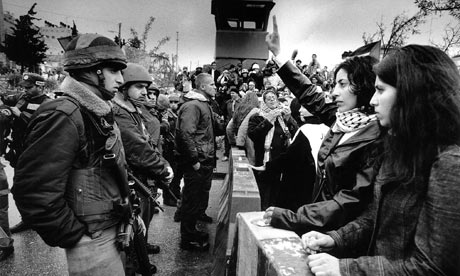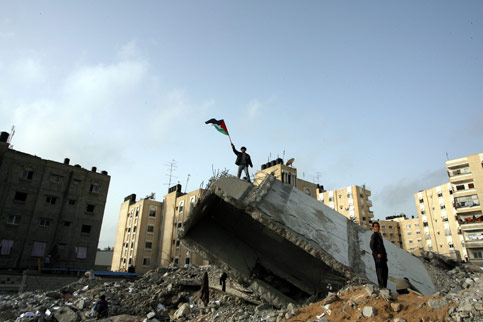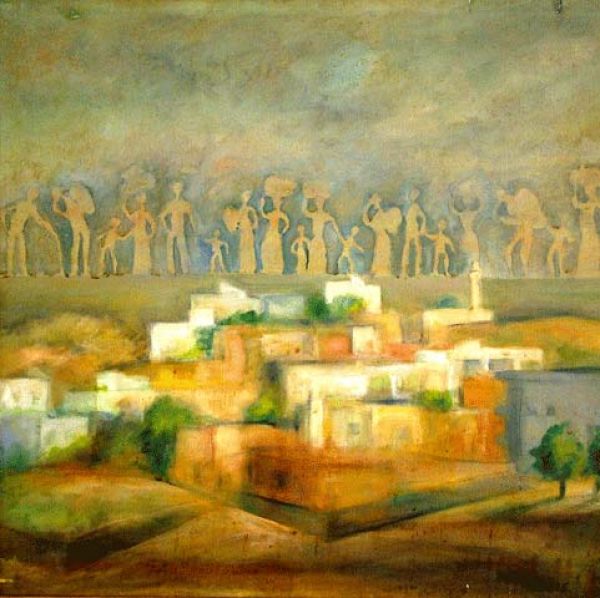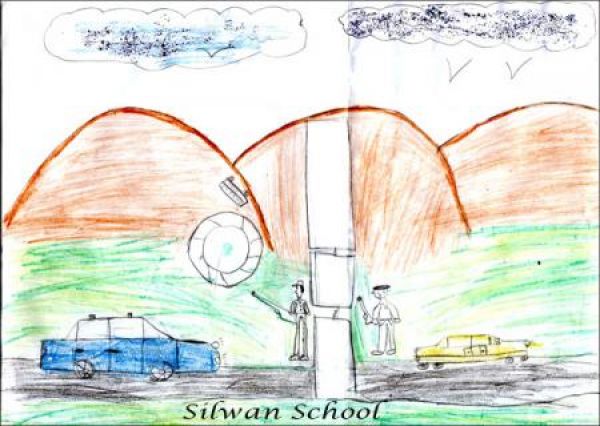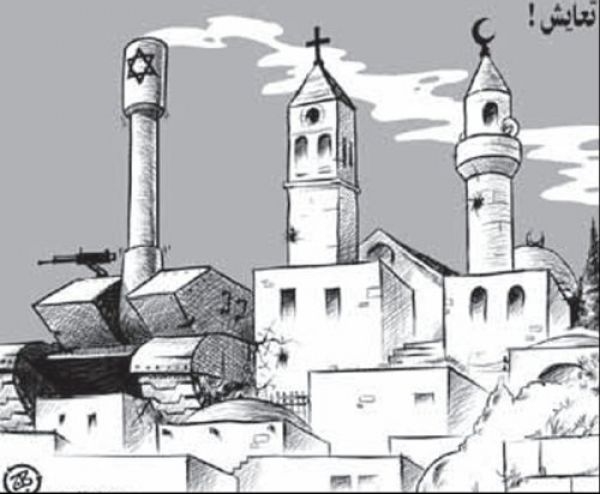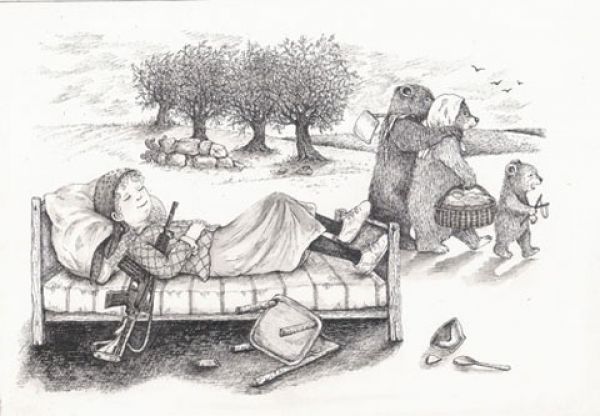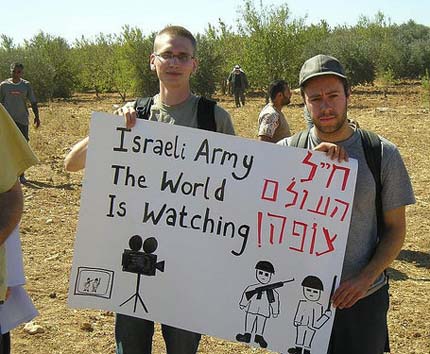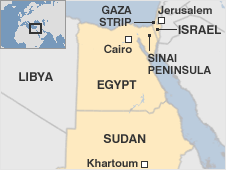Photographer Ryuichi Hirokawa’s best shot: The Guardian
Interview by Melissa Denes, The Guardian – 30 Apr 2009
I took this in 2002, at Al-Ram checkpoint on the West Bank. All the checkpoints had been closed by Israeli troops and these women were demonstrating to have them opened, so that food and medical supplies could come through. An hour before, a group of men had been demonstrating, but the soldiers pulled out their batons so the women – who were both Palestinian and Israeli – moved to the front.
On the left is a line of Israeli soldiers; that man at the front, with his hands in his pockets, is a policeman. I was drawn to the young woman standing second from the right, who is holding up her hand in a V-sign. She held that for a long time, at least 30 minutes – until the soldiers began to throw tear gas canisters.
You can see the press at the back. I don’t like to work from such a position of safety. I’ve been taking photographs in Israel and the West Bank since 1967. This one became symbolic for me, and last year I included it in my film Nakba (Catastrophe), which features hundreds of photographs and interviews with Palestinians displaced after 1948.
As a student in Japan, I was very idealistic. I read the Jewish philosopher Martin Buber and decided to work on an Israeli kibbutz. One day, I found some bullets in a field nearby and asked where they might have come from. No one knew – then a young Jewish man showed me an old map that had the Palestinian name for the place where we were working.
I began photographing the ruins of Palestinian villages and exhibited them in Jerusalem in 1969, in a show called Security. There was an angry response: people wanted to know whose security I was referring to. But one entry in the visitors’ book, written by a Jewish student, said: “In Israel we only ever hear one side; these pictures show us the other side.” I have been to Palestine 30 to 40 times now, most recently to Gaza in January. This is what I keep trying to show.
EDITOR: Gideon Levy has always been the most thoughtful, challenging and morally founded columnists in Haaretz, and in Israel. He has moved his political positioning much to the left over the last couple of years, and this article is the clearest he has written yet, a condemnation of the cozy self-image of the so-called Israeli left “peace camp”. Timely and accurate.
There has never been an Israeli peace camp: Haaretz
By Gideon Levy
The Israeli peace camp didn’t die. It was never born in the first place. While it’s true that since the summer of 1967, several radical and brave political groups have been working against the occupation – all worthy of recognition – a large, influential peace camp has never existed here.
It’s true that after the Yom Kippur War, after the first Lebanon War and during the giddy days of Oslo (oh, how giddy those days were), citizens took to the streets, generally when the weather was nice and when the best of Israeli music was being performed at rallies, but few people really said anything decisive or courageous, and fewer still were willing to pay a personal price for their activities. After the assassination of Prime Minister Yitzhak Rabin, people lit candles in the square and sang Aviv Geffen songs, but this certainly isn’t what one would call a peace camp.
It is also true that the stance advocated by the so-called Matzpen movement immediately after the Six-Day War has now more or less become the Israeli consensus position – but it is mere words, devoid of content. Nothing meaningful has been done so far to put it into practice. One would have expected more, a lot more, from a democratic society in whose backyard such a prolonged and cruel occupation has existed and whose government has primarily invoked the language of fear, threats and violence.
There have been societies in the past in whose name frightful injustice has been committed, but at least within some of them, genuine, angry and determined left-wing protest took place – of the sort that requires personal risk and courage, and which is not limited to action within the cozy consensus. An occupying society whose town square has been empty for years, with the exception of hollow memorial rallies and poorly attended protests, cannot wash its hands of the situation. Neither democracy nor the peace camp can.
If people didn’t take to the streets in large numbers during Israel’s Operation Cast Lead in Gaza, then there isn’t a genuine peace camp. If people don’t flood the streets now – when dangers lie in wait and opportunity is wasted time after time, and democracy sustains blow after blow on a daily basis and there are no longer sufficient resources to properly defend it, and when the right wing controls the political map and settlers amass more and more power – then there is no genuine left wing.
There is nothing like the debate over the future of the Meretz party to demonstrate the sorry state of the left. This comes in the wake of the strange and ridiculous report last week about the party’s poor showing in the last election, and which gives every possible recommendation. Meretz disappeared because the party fell silent; you don’t need a commission to find that out. But even during its relatively better days, Meretz was not a real peace camp. When Meretz applauded Oslo, it deliberately ignored the fact that the champions of the “historic” peace accords never intended to evacuate even a single settlement over the course of the great “breakthrough” that earned its promoters Nobel peace, yes, peace prizes. This camp also overlooked Israel’s violations of the agreements, its illusions of peace.
Above all, however, the problem was rooted in the left’s impossible adherence to Zionism in its historical sense. In precisely the way there cannot be a democratic and Jewish state in one breath, one has to first define what comes before what – there cannot be a left wing committed to the old-fashioned Zionism that built the state but has run its course. This illusory left wing never managed to ultimately understand the Palestinian problem – which was created in 1948, not 1967 – never understanding that it can’t be solved while ignoring the injustice caused from the beginning. A left wing unwilling to dare to deal with 1948 is not a genuine left wing.
The illusory left never understood the most important point: For the Palestinians, consenting to the 1967 borders along with a solution to the refugee problem, including at least the return of a symbolic number of refugees themselves, are painful concessions. They also represent the only just compromise, without which peace will not be established; but there’s no sense in accusing the Palestinians of wasting an opportunity. Such a proposal, even including the “far-reaching” proposals of Ehud Barak and Ehud Olmert, has never been made to them.
Meretz will surely find some kind of organizational arrangement and will again get half a dozen members elected to the Knesset, on a good day maybe even a dozen. This doesn’t mean much, however. The other left-wing groups, both Jewish and Arab, remain excluded. No one has any use for them, no one thinks about including them, and they are too small to have any influence. So let’s call the child by its real name: The Israeli peace camp is still an unborn baby.
